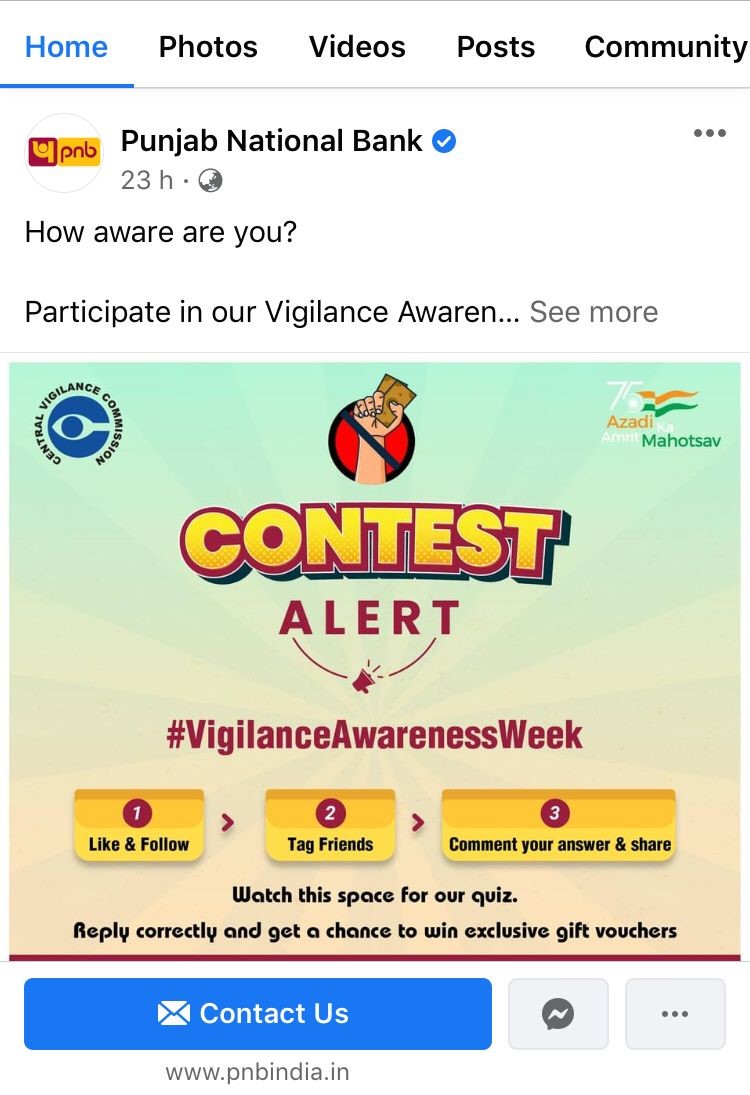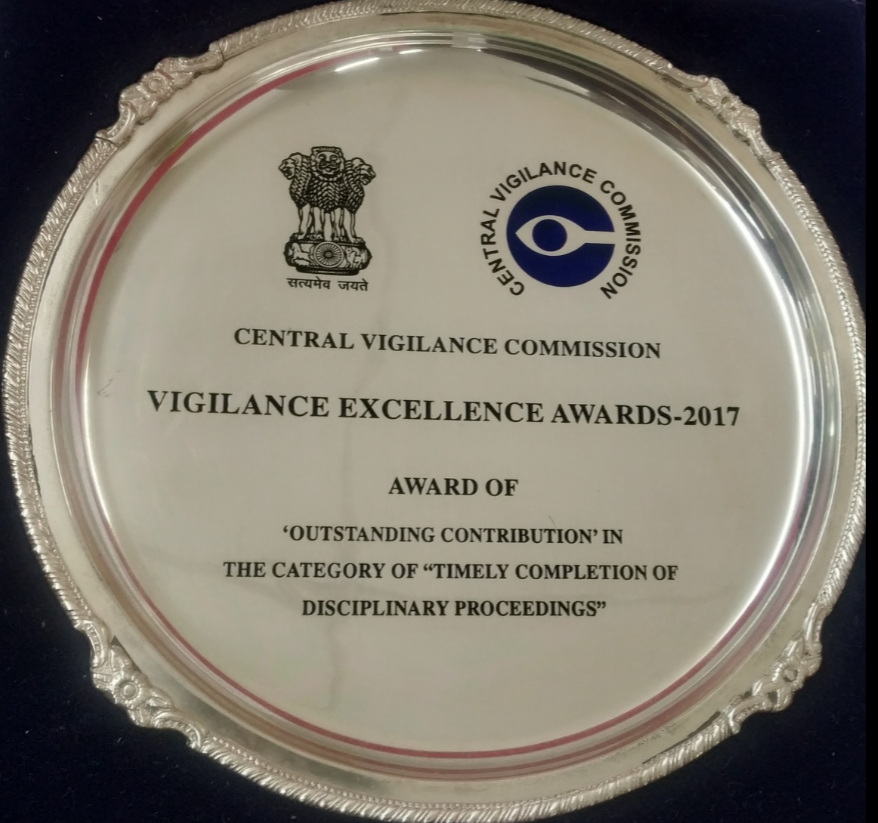The above competitions revolved around the theme was  “Say no to corruption; commit to the Nation”. The participants gave their whole-hearted contribution in making them a huge success. The Bank could inculcate the culture of vigilance among its staff through the involvement of them in these activities.”
“Say no to corruption; commit to the Nation”. The participants gave their whole-hearted contribution in making them a huge success. The Bank could inculcate the culture of vigilance among its staff through the involvement of them in these activities.”
POSTER COMPETITION VAW 2023



An Awareness walk/walkathon was organised by Zonal Office, Delhi at Police Memorial, New Delhi:

The Chief Vigilance Officer has participated in the television programme organized by Times Network and broadcasted during the week on ET-NOW to aware the general public regarding vigilance mechanism and other vital relevant aspects in Public Sector Banks:

Online quiz competition was organized for general public on Bank’s social media accounts i.e. Twitter, Face Book and Instagram attracting good response from the public.

Wide publicity was given to Vigilance Awareness Week through Hoardings at prominent places all over the country.

Other Systemic Improvements undertaken
-
Standard Operating Processes (SOPs)
SOPs have been formulated and placed at PNB Knowledge Centre Portal for field functionaries by all divisions on all major operational functions to desist any deviations from the guidelines of the Bank.
All the major policies are reviewed/ re-iterated by the concerned divisions after amalgamation of e-OBC and e-UNI with PNB to provide ready reference to all staff members regarding policy guidelines of the Bank.
-
Staff Accountability Policy
Navigated requisite improvement in Staff Accountability Policy (March 2020) to meet the spirit of the apt Vigilance Administration in the Bank and align the same with best practices alongwith formation of SOP for smooth roll out.
Active oversight was extended and contributions made to amend the Whistle Blower Policy of the Bank (March 2020). The policy aims to establish a mechanism to receive protected disclosure relating to any allegation of corruption or willful misuse of power/discretion against any employee of the Bank. The chairman of the Audit Committee of the Board will be the competent authority to deal with the protected disclosures received under the policy.
-
Enterprise-wide Fraud Risk Management (EFRM) Solution
EFRMS has been introduced to identify the suspicious fraud patterns or scenarios in real-time. It is now covering 131 possible scenarios to generate alerts, out of which 41 Scenarios are in preventive mode and 90 Scenarios are in monitoring mode.
-
Roles and Responsibilities of Vigilance Officers (KRAs).
The roles and responsibilities (KRAs) of Vigilance Officers in PNB and RRBs have been framed for effective vigilance administration. AGM ranked officers deputed in selected RRB’s for effective vigilance administration
Contact Details:
|
Sr. No.
|
Name
|
Designation
|
Contact Detail
|
Email Id
|
|
1.
|
Sh. Raghvendra Kumar
|
CVO
|
011-28044012
|
cvo[at]pnb[dot]co[dot]in
|
|
2.
|
Shri Raman Kumar Singh
|
Additional CVO- Kolkata
|
|
addlcvokolkata[at]pnb[dot]co[dot]in
|
|
3.
|
Shri Sanjay Kumar Verma
|
Additional CVO - Delhi (Gurugram)
|
|
addlcvogurugram[at]pnb[dot]co[dot]in
|
|
4.
|
Sh. Shiv Prashad
|
DGM HOD
|
011-28044162
|
hodvigilance[at]pnb[dot]co[dot]in
|
|
5.
|
Sh. Basant Kumar
|
DGM
|
011-28044106
|
dgmvigilance[at]pnb[dot]co[dot]in
|
|
6.
|
Sh. Vinay Gupta
|
AGM
|
011-28044326
|
agmvigilance3[at]pnb[dot]co[dot]in
|
|
7.
|
Sh. Madhukar Kumar Sharma
|
AGM
|
011-28044328
|
agmvigilance2[at]pnb[dot]co[dot]in
|
|
8.
|
Sh. Mohammed Arif Mansoori
|
AGM
|
011-28044325
|
agmvigilance4[at]pnb[dot]co[dot]in
|
Vigilance Set Up
Role of Vigilance In Banks:
Banks, which act as an intermediary between depositors and lenders, are duty bound to observe the highest standards of safeguards to ensure that money accepted from depositors are not mis-utilised and are put to gainful use or are available with them to be paid on demand. In order to ensure this, banks are not only required to do due diligence on the borrowers but are also expected to put in place appropriate safeguards to ensure that the transactions being undertaken by the staff are as per laid down guidelines. The watchfulness enforced by the vigilance function is required to ensure that public money, which banks hold in fiduciary capacity is not allowed to be misused by the delinquent elements in any manner. In a sense, an effective vigilance is a sine qua non for good Governance.
An effective vigilance set-up in an organization will certainly ensure the function of all other segments in an efficient way. The purpose of vigilance activity is not to stifle such ability or to obstruct the achievement of organizational goals and objectives but to enhance the managerial effectiveness, both at micro as well as macro levels.
Central Vigilance Commission: -Role &Functions
The monitoring of the vigilance activities, implementation of the anti-corruption measures in the Public Sector, maintenance of purity, integrity and probity in the Public Sector viz, Public Sector Undertakings, Central Government Departments, Ministries and Public Sector Banks is done by the Government through Central Vigilance Commission. It acts as the apex body for exercising general superintendence and control over the vigilance matters in administration.The Commission exercises a general check and supervision over vigilance cases and anti corruption work in the organizations within its jurisdiction
Jurisdiction of CVC
The Commission’s jurisdiction extends to such category of public servants as defined under Section 8(2) of the CVC Act, 2003 and subsequent notifications issued by the Central Government from time to time. Officers of Scale V and above of Public Sector Banks [hereinafter referred to as Category ‘A’ officers] fall within the jurisdiction of the Commission in terms of sub-section (2) of Section 8 of CVC Act, 2003.
JURISDICTION OF CVC OVER OTHER CATEGORIES IN SPECIAL CASES:
Composite cases: If a Government servant falls within the Commission’s jurisdiction i.e. officers of Scale V and above in PSBs, the advice of Commission would be required and any decision of the Disciplinary Authority at this juncture may be treated as tentative. Such a reference would be required to be made even in respect of an officer / staff who are not within the Commission’s jurisdiction if they are involved along with other officers who are within the jurisdiction of the Commission, as the case would then become a composite case and falls within the Commission’s jurisdiction.
A composite case should be processed as ‘one’ and action against every individual employee should be taken only on Commission’s advice, even if there is only one official who comes within Commission’s jurisdiction.
Difference of opinion: The Commission’s advice would also be necessary in cases of difference of opinion between the Disciplinary Authority and the CVO with regard to the action to be taken against officers who are not within the jurisdiction of the Commission if these differences cannot be resolved with the intervention of the MD & CEO of the Bank.
Complaints under PIDPI Resolution: For the purpose of Public Interest Disclosure and Protection of Informer Resolution 2004, the Commission’s jurisdiction extends to any employee of Central Government, corporations established by or under any Central Act, Government companies, societies and local authorities owned or controlled by the Central Government irrespective of the category or class or group of employees.
All references to Central Vigilance Commission by the Bank shall be through the CVO/Vigilance Department.
Vigilance Angle:Vigilance angle is obvious in the following acts:
Demanding and / or accepting gratification other than legal remuneration in respect of an official act or for using his influence with any other official.
Obtaining valuable thing, without consideration or with inadequate consideration from a person with whom he has or is likely to have official dealings or his subordinates have official dealings or where he can exert influence.
Obtaining for himself or for any other person any valuable thing or pecuniary advantage by corrupt or illegal means or by abusing his position as a public servant.
Possession of assets disproportionate to his known sources of income.
Cases of misappropriation, forgery or cheating or other similar criminal offences.
There are, however, other irregularities where circumstances will have to be weighed carefully to take a view whether the officer’s integrity is in doubt. In such cases, the disciplinary authority with the help of the CVO should carefully study the case and weigh the circumstances to come to a conclusion whether there is reasonable ground to doubt the integrity of the officer concerned. For example
Gross or wilful negligence;
Recklessness in decision making;
Blatant violations of systems and procedures;
Exercise of discretion in excess, where no ostensible public interest is evident;
Failure to keep the controlling authority / superiors informed of required transactions and issues in time;
Cause of undue loss or a concomitant gain to an individual or a set of individuals/a party or parties;
Any undue / unjustified delay in the disposal of a case, perceived after considering all relevant factors, would reinforce a conclusion as to the presence of vigilance angle in a case.
The purpose of vigilance activity is not to reduce but to enhance the level of managerial efficiency and effectiveness in the organization. Commercial risk-taking forms part of banking business; therefore, every loss caused to the Bank, either in pecuniary or non-pecuniary terms, need not necessarily become the subject matter of a vigilance inquiry. Thus, whether a person of common prudence, working within the ambit of the prescribed rules, regulations and instructions, would have taken the decision in the prevailing circumstances in the commercial / operational interests of the organization is one possible criterion for determining the bona-fides of the case. A positive response to this question may indicate the existence of bona-fides. A negative reply, on the other hand, might indicate their absence.
Absence of vigilance angle in various acts of omission and Commission does not mean that the concerned official is not liable to face the consequences of his actions. All such lapses not attracting vigilance angle would, indeed, have to be dealt with appropriately as per the disciplinary procedure under the service rules.
Administrative misconduct such as lack of punctuality, drunken behaviour at work, insubordination, etc. would be left to the disciplinary authority to deal with in an appropriate manner. If the lapse is without a vigilance angle, the disciplinary authority would be within its rights to initiate appropriate penalty proceedings against erring employees.
Mechanism for Determining Vigilance Angle
(a) Mechanism of IAC:
The Commission has directed that each bank may set up an Internal Advisory Committee (IAC) of three members, preferably of the level of General Managers but not below the level of Deputy General Managers, to scrutinize the cases arising out of inspections and audit and other staff accountability matters etc. and determine involvement of vigilance angle, or otherwise, in those matters. The Committee shall record reasons for arriving at such a conclusion. The committee will send its recommendations to the CVO. The CVO while taking a decision on each case will consider the advice of the Committee. Such records shall be maintained by the CVO and would be available to an officer or a team of officers of the Commission for scrutiny when it visits the bank for the purpose of vigilance audit.
In our Bank, Inspection and Audit Division, HO is the nodal division for placing the cases before the Internal Advisory Committee and the IAC comprises of three GMs/CGMs & formation of this committee shall be approved by the MD & CEO.
The process of determination of Vigilance overtone in the role of any official corresponding to the actionable lapse comprises of the following stages:
The CO/ ZO/ HO where cause of action has occurred after examination by Staff Accountability Committee refers the matter of all the erring officials to Internal Advisory Committee (IAC) for examination of Vigilance Overtone
The IAC independently examines the role of all the officials for determining as to whether Vigilance overtone exists there or not.
The views of the IAC on the existence of Vigilance overtone or otherwise in the role of any official is then sent to the Chief Vigilance Officer, who examines the same and conveys his views on the existence of Vigilance overtone to the Disciplinary Authority.
After receiving the views of CVO, the Disciplinary Authority examines the matter and forms his independent views on existence of vigilance overtone and sends his views to CVO.
In case, Vigilance overtone is perceived by the DA in agreement with the CVO (whether initially or after reconsideration), vigilance case is registered at the Vigilance Department. In cases where, Vigilance Overtone is not perceived by the DA in agreement with the views of CVO, further action/ disciplinary proceedings are initiated by the DA in a manner deemed appropriately by them under Non-Vigilance category.
However, in case where there is difference of opinion between the CVO and the Disciplinary Authority regarding the determination of existence of Vigilance overtone, the issue is initially referred to the CVO by Disciplinary Authority quoting the reasons for its disagreement with the views of CVO. In case the disagreement continues, the matter is referred to the MD & CEO of the Bank through CVO for resolution of the difference. If the difference still persists, the same may be referred to the Commission for a final view.
While referring the cases to IAC for examination of Vigilance overtone, a self contained note (SCN) containing all aspects of the case, specific roles played by the respective officials, deviations resorted by them, amount involved, amount of the security available, apprehended loss, etc are to be furnished by the respective administrative office where the lapse has occurred.
(b) Difference of opinion with DA on perceiving Vigilance Overtone
In case of difference of opinion between the DA and the CVO, the said issue is initially referred to the MD & CEO in respect of officers not coming under the jurisdiction of the Commission. If the difference persists, the same may be referred to the Commission for taking a final view.
However, in case of officials coming under the jurisdiction of the Commission, the difference of opinion; between DA and CVO, would be referred to the Commission.
*Investigation / inquiry report on the complaints / cases arising out of audit and inspection, etc., involving a vigilance angle will have to be referred to the Commission for advice even if the Competent Authority in the bank decides to close the case, if any of the officers involved is of the level for whom the Commission’s advice is required.
VIGILANCE REGISTERED CASES- JURISDICTION
CVC Cases: The Commission decides only such vigilance cases in which an officer of the rank of Scale V and above is involved. These cases are required to be referred to the Commission for advice through the Chief Vigilance Officer. Such cases will be referred to as CVC cases.
Composite Cases: In case there is involvement of official of the level of Scale IV or below in the same matter in which an officer of Scale V or above is involved, the Commission’s advice would be necessary for all the officialsincluding non-vigilance cases also. These cases are categorized as CVC Composite Cases.
Non-CVC Case: Remaining cases of all officials up to the level of Scale IV which do not fall within the direct jurisdiction of the Commission are referred to CVO for concurrence before initiating any action against them. Such cases are called Non-CVC cases.
Consultation Mechanism with CVO and CVC in Vigilance Cases:
First Stage Advice (FSA):
Consultation with CVC: CVO shall refer only the CVC cases and Composite cases to CVC seeking Commission’s First Stage Advice.
Consultation with CVO: DA needs to refer all the Vigilance registered cases to Chief Vigilance Officer seeking CVO’s First Stage Advice.
Second Stage Advice (SSA):
Category A Officers and Composite Cases: As regards Second stage consultation with the CVC for aforesaid officials, the Commission has decided to dispense with the consultation for second stage advice of the Commission in cases where the DA on conclusion of disciplinary proceedings, proposes to impose a penalty which is in line with the Commission’s first stage advice. Such cases would be dealt at the level of CVO and DA concerned. However, while dispensing with the requirement of seeking second stage advice with the CVC, the Commission has expected that
The CVO would be in a position to exercise proper check and supervision over such cases and would ensure that the cases are disposed off expeditiously within the time norms stipulated by the Commission and
The punishment awarded to the concerned officer is commensurate with the gravity of the misconduct established on his/ her part.
As such, the Second stage reference of all the aforesaid officials will continue to be referred to the Chief Vigilance Officer seeking CVO’s SSA. Also, a copy of the final order issued by DA in all cases is forwarded to CVC for its record. It is also to be remembered that all such cases where the DA proposes to take any action which is at variance with the Commission’s first stage advice would continue to be referred to the Commission for obtaining second stage advice.
Category B Officers: The Commission has prescribed that consultation with CVO for Second stage advice in respect of such cases where the Disciplinary Authority proposes to impose a penalty which is in line with the CVO’s first stage advice is not required. However, in disciplinary cases of officers where the DA tentatively proposes to take any action which is at variance with the CVO’s first stage advice, would continue to be referred to the CVO for obtaining CVO’s second stage advice.
RECONSIDERATION OF ADVICE:
Commission may be consulted for reconsideration of its FSA only. The Commission entertains the reconsideration proposal for one time only first stage advice and strictly when there are new facts which have not been considered by the Commission earlier. The reconsideration of advice will be only in exceptional cases at the specific request of the DA, before a decision is taken by it to impose the punishment or otherwise. After a decision has been taken by DA, the Commission will not entertain any reconsideration proposal. Such cases will be treated only as “deviation” from and non-acceptance of Commission’s advice.
The commission has advised that they have dispensed with consultation for reconsideration of its second stage advice. No proposal for reconsideration of the Commission’s second stage advice would be considered by the CVC.
DEVIATION FROM / NON-IMPLEMENTATION OF COMMISSION’S ADVICE:
When the Disciplinary Authority deviates from or does not implement the Commission’s advice, the CVO may bring it to the notice of the Commission. The Commission may consider it for inclusion in its Annual Report as a case of non-implementation of Commission’s advice.
When the Appellate Authority’s order is at variance with Commission’s advice, the CVO may forward a copy of Appellate Authority’s Order to the Commission. The Commission may consider it for inclusion in its Annual Report as a case of non-implementation of Commission’s advice.
Time Frame
CVC has prescribed the time frame for various action points .The time limit so given by the Commission represents the outer limit for the given action point. Undue delays may result in departmental action against the concerned officials. The timelines given by our Bank for Disposal of Vigilance Disciplinary Action Cases are provided in circulars issued by Inspection & Audit Division of the Bank.
In case of any delay in referring the cases for 1st or 2nd stage advice to Vigilance Department, HO, the DA will have to specifically comment on the delay.
Vigilance Officers
In order to supervise the vigilance administration throughout the length and breadth of India as per the spread of Punjab National Bank, a team of vigilance officers have been posted in all the Zonal Head Quarters and RRBs of the Bank. They are under the direct control of CVO of the Bank.
Vigilance Officers work in the field i.e. Zones reporting to Vigilance Department through Head of the Department (Vigilance) and as per the directions given by him. They are posted primarily to prevent malpractices and to suggest steps to curb corruption. Broadly, the KRAs of VOs can be classified as under:
Preventive
Investigative
Monitoring
Others
Click here for Contact Details of Vigilance Officers
Reference to CBI / Police / State CID / Economic Offences Wing of the State Police Concerned
Although the CBI has powers to take up any fraud case for investigation irrespective of the amount of loss involved, in order to maximize the effectiveness of investigations. The guidelines of Central Vigilance Commission/ RBI for reporting of fraud cases to Police/ CBI are as under:-
|
Amount involved in the fraud
|
Agency to whom complaint should be lodged
|
Remarks
|
|
Above Rs. 10,000/- but below Rs. 1 Lakh, only if staff of the bank involved.
|
State Police To the local police station
|
To be lodged by the bank branch concerned.
|
|
Rs. 1 Lakh and above and Below Rs. 300 Lakh involving outsiders and bank staff
|
To the State CID/Economic Offences Wing of the State concerned
|
To be lodged by the officer designated by CO/ZO.
|
|
Rs. 300 Lakh and above and up to Rs. 2500 lakh
|
CBI
|
#To be lodged by the officer designated by CO/ZO with Anti-Corruption Branch of CBI (where staff involvement is prima facie evident). Economic Offences Wing of CBI (where staff involvement is prima facie not evident)
|
|
More than Rs. 2500 Lakh and up to Rs. 5000 Lakh
|
CBI
|
#To be lodged by the officer designated by CO/ZO with Banking Security and Fraud Cell (BSFC) of CBI (irrespective of the involvement of a public servant).
|
|
More than Rs. 5000 Lakh
|
CBI
|
#To be lodged by the officer designated by CO/ZO & authorized by CVO with the Joint Director (Policy) CBI, HQ New Delhi.
|
All FIR to CBI be submitted to Head of Zone (designated as Nodal Officer), BS&F Zone, CBI, 5-B, 10th Floor, “A” Wing, CGO Complex, Lodhi Road, New Delhi.
Cases to be referred to CBI
Cases of Rs. 3.00 crore and above should be reported to CBI, after permission from competent authority and after getting draft approved from Vigilance/ Law Division.[CVO in consultation with competent authority may refer a case involving less than Rs. 3 crore or a case which cannot be classified on monetary limits, to the CBI, if, the case is of serious nature and/ or has an inter-state or International ramification].
“In terms of CVC Office Order No 02/01/22 dated 06.01.2022, all large fraud cases involving amount of Rs. 3 Crore and above and examine the role of all level of officers/Whole Time Directors (including ex-officials/ex-WTDs) be referred to Advisory Board for Banking & Financial Frauds (ABBFF) before recommendations/ references are made to the investigative agencies, i.e., CBI and on receipt of its recommendation/ advice, further action in such matters be undertaken.”
The matters which the CBI suomoto propose to take cognizance by way of PE/ RC, the procedure u/s 17A of the PC Act, 1988 [as amended w.e.f. 26.07.2018 vide SO3664 (E) dated 26.07.2018] would be followed by CBI and such matters shall not be referred to the Board.
(For detailed guidelines, Policy on Fraud Risk Management & Investigation Functions (FRMIF) issued by FRMD, HO may be referred.)
(b) Cases to be referred to State Police, where fraud is below Rs. 300 lakh.
As per existing guidelines, the time line for filing of such FIRs are the same as applicable in fraud cases involving Rs. 300 lakh & above. Once the element of fraud involving below Rs. 300 lakh is confirmed, following time norms shall be adhered to:-
|
S.No
|
Guidelines
|
|
1.
|
In fraud cases involving amount of Rs. 10000.00 & above but below Rs. 1 lakh (only if staff of the bank is involved), the concerned branch/office to lodge FIR with local Police Station within 3 days of detection of fraud.
|
|
2.
|
In fraud cases involving amount of Rs. 1 lakh & above (but below Rs. 300 lakhs) branch /Office to submit the draft FIR to Circle/ Controlling Office through email within 3 days of detection of fraud.
|
|
3.
|
The Circle/ Controlling Office will send the approved draft of FIR through email to branch/ office within 3 days of receipt of draft FIR and advise as under:
a) To lodge FIR with CID/ EOW of State Police and
b) Name, Designation of the bank official authorized to lodge the FIR.
|
|
4.
|
Branch Head/ Authorized official will lodge the FIR with CID/ EOW within 3 days of receipt of approved draft of FIR.
|
Agreed List & List of Officials of Doubtful Integrity:
In order to keep a watch on the activities of public servants who are of doubtful integrity, the Ministries / Departments / Organizations are required to maintain two lists viz.
“Agreed list” and
List of public servants of “doubtful integrity”.
Agreed List: “Agreed List” of officials shall be prepared on the basis of available information from Controlling Offices/other sources. The agreed list will include the names of officers whose integrity is doubtful or suspicious. These lists are finalized after discussion and mutual consultation among the Controlling Offices/ Department concerned, CVO and CBI.
List of public servants of “doubtful integrity: It is the duty of the Heads of Departments to locate and suitably deal with the corrupt officials. Each Ministry/ Department/ Organization is required to prepare lists of public servants of Doubtful Integrity, which includes names of those officers only who, after inquiry or during the course of inquiry have been found to be lacking in integrity.
The purpose of maintaining and updating these lists are to ensure that these officers are not posted to sensitive positions/transferred from sensitive positions,if they are occupying one.
Sanction of Prosecution:
Under Section 19 of Prevention of Corruption Act, it is necessary for the prosecuting authority to have the previous sanction of the appropriate administrative authority for launching prosecution against a public servant. The officials of the bank are `public servants`, within the provisions of the Prevention of Corruption Act.
The requirement of previous sanction is intended to afford a reasonable protection to public servant from frivolous, malicious or vexatious prosecution and to save him from unnecessary harassment or undue hardship. The administrative authority alone is in a position to assess and weigh the accusation against the background of their own intimate knowledge of the work and conduct of the official. The sanctioning authority has an absolute discretion to grant or to withhold sanction after satisfying himself whether the material placed before it discloses a prima facie case against the officials sought to be prosecuted. The grant of sanction or refusal of prosecution is given by the competent authority after a clear-cut application of mind as the same is an administrative function performed in a quasi-judicial manner. The competent authority should, therefore, record reasons even in cases where sanction for prosecution is not accorded. The Sanctioning Authority has only to see whether the facts would prima-facie constitutes the offence. The question of giving opportunity to the employee at this stage does not arise.
In terms of the Supreme Court directives, the matter with regard to according permission to prosecute an officer should be expeditiously processed and required sanction accorded within a period of three months [outer limit]. In case, the Disciplinary Authority takes a view different from that of the CBI/Police/State CIDs/Economic offences Wing of State Police, a reference is required to be made to the CVC through CVO for advice of CVC irrespective of the level of the official involved. It may be noted that when the Bank refuses permission for sanction of prosecution as requested for by CBI, the issue may come up for arbitration at CVC. The Bank would be required to defend its decision with documentary proof, if called for. Hence, DA should be extremely careful in taking a decision in this regard.
Further, where the investigation has been made by State Police authorities involving a Central Government Employee (including Bank Officials) request for sanction for prosecution of the Competent Authority may be considered, even though such request was not routed through CBI.
In case of difference of opinion between the Competent Authority and the CBI/other investigation agencies, where the latter has sought for sanction of prosecution of the Public Servant, the Commission on a review of existing mechanism has decided to dispense with the mechanism of holding joint meetings with the representatives of CBI and the concerned Department / Organisation and henceforth all such matters of difference of opinion with CBI/ investigation agencies would be dealt and resolved by the commission on the basis of available documents / materials and the tentative views of the Competent Authorities of the concerned Ministry/ Department/ Organisation.
In order to ensure that the cases for grant of sanction of prosecution are decided quickly, the Commission would , therefore, entertain only those cases for reconsideration wherein new facts or circumstances which warrant any change are brought out by the Competent Authorities / administrative authorities specifically while making such proposals to the Commission.
Reference To Chief Technical Examiner (CTE)
The current monetary limits are defined below for reporting the jobs/ works under taken to be reported to CTEs in the Quarterly Progress Reports (QPRs) on the prescribed proforma:
|
NO
|
WORKS / CONTRACTS
|
VALUE
|
|
A
|
Civil Works
|
Rs 5 cr& above
|
|
B
|
Turnkey Work Contracts
|
|
C
|
Stores & Purchases
|
|
D
|
PPP-Public Private Partnership [Cost/Revenue values]
|
|
E
|
Sale of Goods/Scrap/Land
|
|
F
|
Electrical/ Mechanical works/ Maintenance/ Service contracts including Electronics/ Instrumentation/ Telecommunication/ Manpower supply etc. It also includes air conditioning, fire fighting, fire alarm and all other allied works
|
Rs 1 cr& above
|
|
G
|
Medical Equipment
|
Rs 50.00 lac & above
|
|
H
|
Consultancy contracts
|
Rs 1 cr& above
|
|
I
|
Horticulture Works
|
Rs 10.00 lac & above
|
|
j
|
Supply of Medicines
|
4largestvaluecontracts.
|
In case no works are awarded for more than the threshold value mentioned under each category, 2 contracts with highest value in each of such sub-category should be reported. In case no contracts are awarded “NIL” QPRs may be sent.
CVO to certify on the QPR that all the Works/ Purchases/Consultancies and other contracts required to be reported as per circular have been included in the QPR.
Tenders
All procuring entities should have tender enquiry documents, in line with the extant rules, regulations, directives, procedures, etc. A set of standard documents should broadly have prescribed standard and procurement specific contents, following standard document templates, to the possible extent. SOP for any alterations/deviations permitted in the standard contents and templates with appropriate legal and financial advice must be in place. The tender documents must, at least, contain information as to the complete description / specifications of the subject matter of the procurement with quantity, timeline for meeting contractual obligations, instructions to the prospective bidders on bidding process/various process timelines/ bid eligibility and evaluation criteria/standard set of documents for bid submission and complete set of terms and conditions which will govern the contract agreement and its performance. All the appropriate and adequate terms and conditions must be included in the tender documents. It is imperative to go into detailing of a procurement case, bringing out different complexities involved in the specifications / design of the subject matter, prevailing conditions affecting the procurement and other ground realities. Tender terms and conditions, standard as well as procurement case specific, must be adequate to meet all such complexities / prevailing conditions / other foreseeable factors affecting successful execution of the procurement case / uncertainties to a reasonable extent. Also, it is important to ensure that a due balance between the interest of the employer and the contractor is maintained, by incorporating suitable terms and conditions in the tender documents, in consultation with the associated finance and legal advisor.
The Commission had issued specific directions that the use of information technology be maximised so as to eliminate the personal interaction of Government officials with public, with a view to increase the element of transparency in functioning and to ensure elimination of the corrupt practices by the public servants. For improving vigilance administration by leveraging technology, the Commission issued the following broad guidelines.All the tenders are to be floated/ placed on the website of the Bank.
Assets & Liabilities Statements
In terms of Clause 20(2) of PNB Officer Employees` (Conduct) Regulations, 1977, it is incumbent upon every officer employee to submit the complete returns of his / her movable, immovable and valuable property including liquid assets, like shares, debentures (Assets & Liabilities Statement) as on 31st March every year. These returns are to be submitted by 30th June every year.
All the officers working in the bank should file their Assets & Liabilities as on 31st March in PNB Parivar (HRMS) by using the link `Assets & Liabilities" available under `Employees Self Service´ and also to print the same for submission of the same to the competent authority in physical form after appending their signatures.
It is the responsibility of the Circle Head / Divisional Head of HO Divisions to ensure that the return is not only received in time from all the officials under their respective jurisdictions but is also scrutinized carefully as per the Government guidelines (20 % of the returns) as a part of Preventive Vigilance.
Circle Heads and Divisional Heads are required to send confirmation to the Chief Vigilance Officer, HO that all the Officers upto MMG Scale-III working in the Circle Office/Division have filed Assets & Liabilities Return for the year and 20 % of the Returns have been scrutinized as per Govt. guidelines, latest by 31st July.
All officers in Senior Management Grade and Top Executive Grade i.e. Scale-IV & above are to file the returns with the Chief Vigilance Officer, Vigilance Department, Head Office, N Delhi.
For broad guidelines and clarifications relating to Vigilance Administration in the Bank, it is advised to regularly visit website of Central Vigilance Commission at www.cvc.gov.in.
Note of Caution : All concerned are requested to refer to relevant extant HO/ CVC guidelines/ circulars.
Click here for Central Vigilance Commission Website
Click here for Case studies
Punjab National Bank (PNB) has been conferred with the prestigious “Vigilance Excellence Awards-2017” in function organized by CVC at VigyanBhawan, New Delhi on 30.11.2017. The award was given away by Hon’ble Vice President of India Shri M. Venkaiah Naidu to PNB for “Outstanding Contribution” in the category of “Timely Completion of Disciplinary Proceedings”
